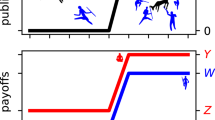Abstract
Cooperation based in mutual benefit provides a perfect scenario to start selfish behaviors aimed to obtain greater benefit at the expense of the partner. Here we investigate if mutual benefit cooperation can be stable between individuals that cooperate with kindness (good partners) or if they will be displaced by other individuals that try to obtain more benefit with less cost (bad partners). Our model assumes an asymmetry between partners in such a way that one of them (actor) proposes the cooperation whereas the other (receiver) always accepts the offer. It also assumes that actors can choose the partner on the basis of their past experiences with the potential partners. With the help of a simple two-locus mathematical model we show that not only the gene that conditions the actor preference to choose good partners can increase in frequency but also the gene responsible of the good partner behavior.
Similar content being viewed by others
References
Axelrod R, Hamilton WD (1981) The evolution of cooperation. Science 211:1390–1396
Castro L, Toro MA (2004) Mutual benefit can promote the evolution of preferential interactions and in this way can lead to the evolution of true altruism. Theor Popul Biol 65:239–247
Castro L, Toro MA (2006) Assortative mating through a mechanism of sexual selection. J Theor Biol 243:386–392
Castro L, Toro MA (2007) Mutual benefit cooperation and ethnic cultural diversity. Theor Popul Biol 77:392–399
Frank SA (2006) Social selection. In: Fox CW, Wolf JB (eds) Evolutionary genetics: concepts and case studies. Oxford University Press, New York, pp 350–363
Hamilton WD (1964) The genetical evolution of social behaviour I-II. J Theor Biol 7:1–52
Hill K (2002) Altruistic cooperation during foraging by the Ache, and the evolved human predisposition to cooperate. Hum Nat 13:105–128
Hill K, Hurtado M (1996) Ache life history: the ecology and demography of a foraging people. Aldyne de Gruyter, Hawthorne
Kirkpatrick M (1982) Sexual selection and the evolution of female choice. Evolution 36:1–12
Maynard Smith J, Szathmáry E (1995) The major transitions in evolution. W.H. Freeman, Oxford
Nesse RM (2007) Runaway social selection for displays of partner value and altruism. Biol Theor 2:143–155
Nowak MA (2006) Five rules for the evolution of cooperation. Science 314:1560–1563
Sherratt TN, Roberts G (1998) The evolution of generosity and choosiness in cooperative exchanges. J Theor Biol 193:167–177
Trivers RL (1971) The evolution of reciprocal altruism. Quart Rev Biol 46:35–57
West-Eberhard MJ (1979) Sexual selection, social competition, and evolution. Proc Am Phil Soc 123:222–234
West-Eberhard MJ (1983) Sexual selection, social competition, and speciation. Quart Rev Biol 55:155–183
Author information
Authors and Affiliations
Corresponding author
Rights and permissions
About this article
Cite this article
Castro, L., Toro, M.A. To be or not to be a good social partner?. Theory Biosci. 129, 71–75 (2010). https://doi.org/10.1007/s12064-010-0083-y
Received:
Accepted:
Published:
Issue Date:
DOI: https://doi.org/10.1007/s12064-010-0083-y




